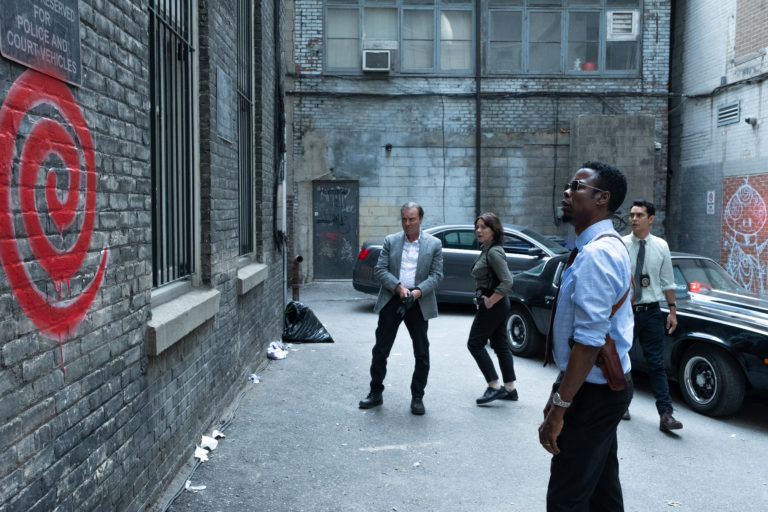Spiral (2021 | USA | 93 minutes | Darren Lynn Bousman)
Over the course of the last several weeks, I’ve been going back through all the previous Saw stories. Across eight films, the series told of everyday people who found themselves caught in tortuous games of life and death that were all orchestrated by the infamous Jigsaw killer. Only a few are worth watching as the series steadily declined into being more and more unnecessarily convoluted to keep the story running past where it should have ended. It is a shame as the first, even with its flaws, remains a standout that left a mark on the horror genre as a well-constructed and inventive film.
So for there to be a new film in the franchise brought a high degree of anticipation and curiosity about what exactly could be done with the long-running story. Having now seen Spiral, it is clear that if anyone has an answer about what to do with the series it was not anyone working on this film. The latest falls into the crowded category of lesser Saw films despite some valiant attempts to take the story in a new direction.
The most courageous move severs the film from most, if not of all, of the previous narrative threads. Obviously, that means losing some of the good aspects of the series. Notably, Tobin Bell does not appear as John Kramer/Jigsaw save for a brief photograph on a table. Bell was a committed part of all the prior films and gave everything to his performances, often elevating writing that really began to lose sight of what was even going on.
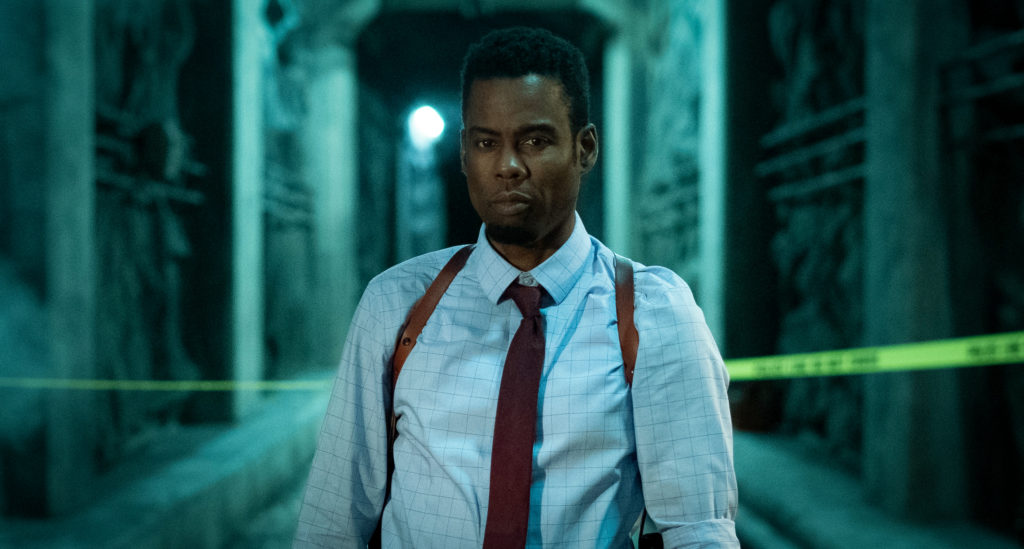
Spiral does not feature Bell and instead stars Chris Rock as detective Zeke Banks. Zeke is a wise-cracking and bitter detective who, underneath his hardened exterior, has a commitment to justice, demonstrated in flashback to a time when Zeke turned in a fellow officer who senselessly gunned down an innocent man. Now he has been labeled a rat and is distrustful of anyone else in his department. Even though this corrupt system is a central theme of the story, the film doesn’t fully understand what it wants to be and it becomes increasingly clear how empty the whole experience is.
The initial setup is that Zeke’s officers are going missing with their bodies later showing up in a horribly mutilated fashion along with tapes and imagery at the scene. Zeke is also being sent mysterious boxes that offer hints as to what to expect next. Despite Jigsaw being long gone, people still bring up his name as a suspect even though Zeke correctly points out that he usually didn’t directly target the police. In fact, to take it a step further, Jigsaw would more frequently target the victims of policing and work with corrupt cops to serve his own ends. Perhaps Spiral aimed to be a deeper deconstruction and criticism of the prior film’s legacy, though it never develops much beyond initial gestures.
Instead, Zeke is left to work through a plodding and muddled story reminiscent of some of the weaker films in the franchise that border on being a police procedural. He will have to work with a new partner, Max Minghella’s William Schenk, to piece together what is happening and identify the perpetrator. He will look to Samuel L. Jackson’s Marcus, his father and former head of the department, for guidance. As he begins to get more personally involved in the mystery, Zeke will soon realize that the threat and who is behind it may be closer than he initially thought.
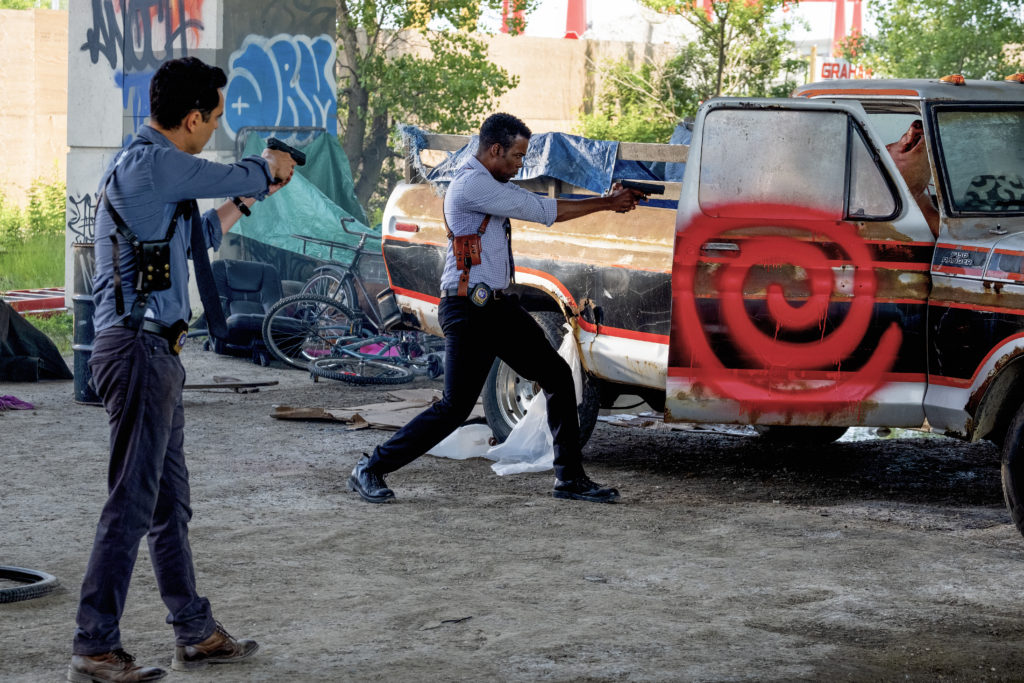
In regards to Zeke as a character, he is a strange one and Rock plays him even stranger. He will often give extended observational jokes, making it feel as though the actor merely wanted a chance to riff and create punchlines more akin to his standup. He also is positioned as being one of the few ostensibly “good cops” who is trying to fix the department, even sticking his neck out at great personal cost to do so. Though it is that one example told through flashback that is largely the beginning and end of his characterization. A soon-to-be ex-wife shows up in a blink and you’ll miss it scene that makes one wonder the purpose of even having her there in the first place.
As for his relationship to his father and how the two work together as officers with vastly different outlooks on the job, there isn’t much to say. Despite the marketing that seemed to position him as a main character, don’t expect much of Jackson in this movie. There is an introductory scene where Zeke says they have become distant. They make plans to reconnect and work on the case, though that never happens. The reason for this is revealed in a previously obscured side moment that proves to be just a narrative contrivance to keep Jackson’s presence regrettably limited. That is, save for a few flashbacks with unintentionally hilarious attempts to make all the characters seem younger than they actually are. These attempts include clearly fake facial hair and a backwards hat that border on being an inside joke rather than a costume change meant to be taken seriously.
It is not a spoiler to say that, thankfully, Spiral does not retread or repeat any of the far overused twists of the prior films in the series. The eventual revelations don’t, at least directly, show that the person behind the killings was yet another disciple of Jigsaw who was just going by his instructions in order to follow in his footsteps. The mysterious figure has taken some of the imagery of Jigsaw, like the pig mask or the dolls, and made it into something new.
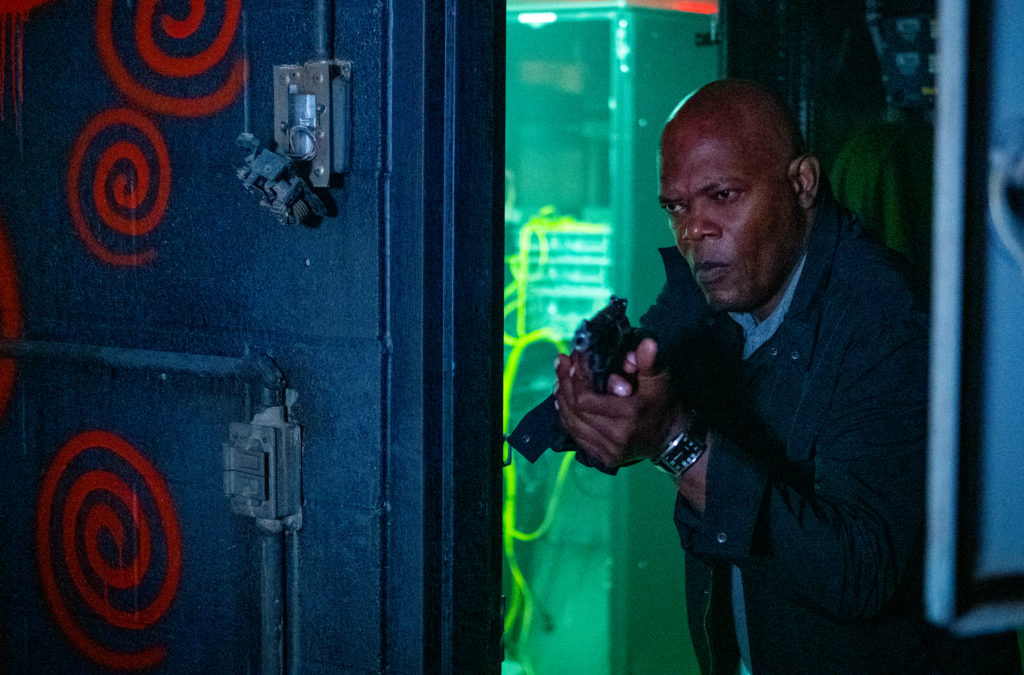
Yes, there are still tapes and messages offering people a way out of the traps, though the strings are clearly being pulled by someone we have never seen before. This person is specifically targeting police who are responsible for violence, brutality, and just general corruption in an attempt to clean up the department.
Dissecting the corruption endemic within modern policing is one of the few praiseworthy elements of Spiral. However, this theme unfortunately becomes increasingly clunky and requires many monologues, complete with flashbacks of events seen moments prior, to lay out. The conclusion then plays out in a manner that loses sight of the potentially intriguing narrative ground to prioritize a twist that lacks anything approaching compelling.
There may be just enough to intrigue the subsection of fans of the franchise who couldn’t care less about the story and are only here for the terrifying new torture traps. Appropriately gory and violent, they are consistently brutal though not quite as terrifying as some of the prior installments. What instilled the traps of the past with tension was the steady counting down of time and the suspense of whether the person could figure out how to survive before it was too late. Spiral does a consistently poor job of establishing this timing, making it hard to overlook how the traps are just fundamentally lacking in inventiveness or anything resembling cleverness.
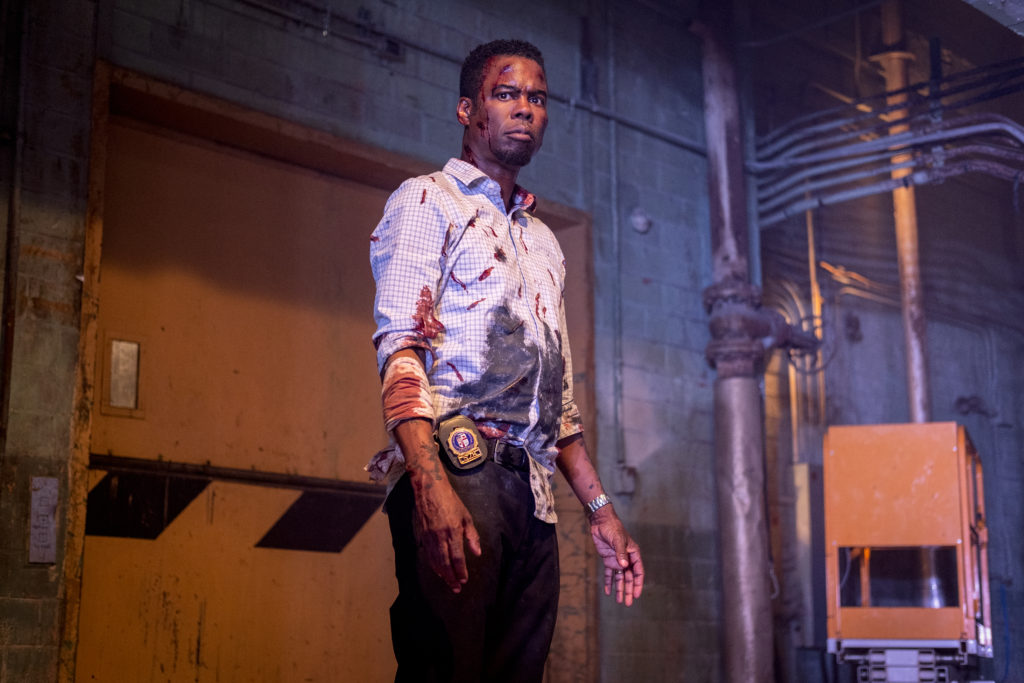
All of this to say, the film feels less like a reinvigoration of the series and more of a postmortem. Spiral was an opportunity to take the story in new directions and it certainly made some efforts to do so. However, if this is the best attempt at reviving what seemed to be a dead series, then it just may not be in the cards for Saw to continue on.
After this most recent incarnation, if one had to make the choice about whether the series should live or die, it may just be time to let it die by letting the clock run out.
Spiral is available in select theaters starting May 14. Photos courtesy of Lionsgate.




